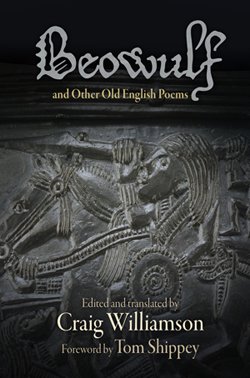Watch: English Professor Craig Williamson Reads from His Translation of Beowulf in Old English

When Professor of English Literature Craig Williamson first let his students hear the 200 lines of Beowulf he had translated, one of them threw a copy of an already published translation they had been reading in class on the floor. He told Williamson the translator of that version should be ashamed. The class enjoyed Williamson's translation so much, they "assigned" him a certain number of lines to translate every week. When the class ended, Williamson continued to finish what is now a completed translation, Beowulf and Other Old English Poems (2011, University of Pennsylvania Press).
"It's as if the 1,000-year-old poet has come to life again in my own learning and language," says Williamson of teaching the poem from his own translation. "Together, we string together words and shape a vision across the bridge of time, haunting the mead hall, swapping old stories, and waiting for Beowulf to meet Grendel in the middle of the night. It's a privilege to share the poet's voice."
"Reading [Williamson's Beowulf] really feels like reading Old English," says Chris Geissler '13, an honors linguistics and religion major from Maplewood, N.J., who is currently taking his second course with Williamson and has read Beowulf in both. "In his translation, many of the words themselves have been part of the English language for a long time. He struggled to shape the alliteration patterns that define how poetry works in Anglo-Saxon English. You can see that he had a really good time translating it."
While many versions of Beowulf have been published, Williamson's is unique due to his position as both a poet and a scholar of Old English. The dual roles allow him to keep the translation poetically beautiful while maintaining the meaning and style of the original Old English poetry.
"If I'm using modern words to capture the subtle meanings of the Old English, I need to do it in a way that makes it sound as if it's part of the original poem," he says. "There's an Anglo-Saxon way of being humorous and I sometimes do that. My translations are not word-by-word translations or even line-by-line translations. They're translations of the deep underlying sense."
Old English, a predecessor to modern English and spoken over 1,000 years ago, may seem like a foreign language to many English speakers. Only about 30,000 lines of Old English poetry remain, of which Williamson has translated about three-quarters. Williamson hopes to eventually publish a complete translated collection of all available Old English poems. Among these 30,000 lines, however, Beowulf remains the most important and widely studied.
"Beowulf is generally recognized as the greatest of Old English poems," says Williamson. "Even though it was written some time before 1,000 AD, the story just refuses to be forgotten. And I think it will last forever because it will still be a good story."


